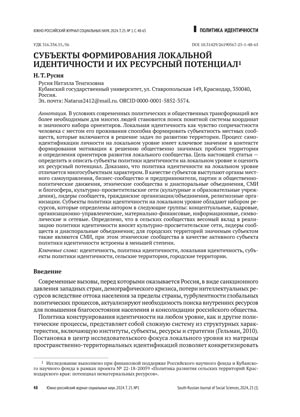Abstract
In the current context of political and social transformations, it is becoming increasingly important for many people to search for a comprehensible system of coordinates and a meaningful set of reference points. The concept of local identity, defined as an individual’s sense of belonging to their place of residence, plays a significant role in shaping the subjectivity of local communities engaged in addressing issues related to territorial development. The self-identification of an individual at the local level is crucial in shaping the motivation to solve problems of public importance for the territory and in establishing guidelines for the development of the local community. The objective of this paper is to identify and describe the actors of identity politics at the local level and assess their resource potential. The research argues that local identity politics is defined by its multi-subject nature. The actors in this process include local self-government bodies, businesses and entrepreneurs, political parties and socio-political movements, ethnic communities and diaspora associations, the media and blogosphere, cultural and educational networks (cultural and educational institutions), community leaders, civic organizations/associations, and religious organizations. The actors engaged in identity politics at the local level possess a set of resources that the author has classified into the following categories: conceptual, staff, administrative-organizational, material and financial, informational, symbolic, and network. It was demonstrated that cultural and educational networks, community leaders, and diaspora associations in rural communities contribute significantly to the implementation of identity politics. In urban areas, the media is also a significant subject, while ethnic communities are less integrated into identity politics as an important participant.
Keywords
Acknowledgements
The study was financially supported by the Russian Science Foundation and the Kuban Science Foundation within the framework of project No. 22-18-20059 “Policy for the development of rural areas of the Krasnodar Territory: the potential of intangible resources”.References
- Anderson, B. (2016). Voobrazhayemyye soobshchestva. Razmyshleniya ob istokakh i rasprostranenii natsionalizma [Imagined communities. Reflections on the Origin and Spread of Nationalism]. M.: Kuchkovo pole.
- Achkasov, V. A. (2005). Etnicheskaya i regional’naya identichnost’ v rossiyskom pole politiki [Ethnic and Regional Identity in The Russian Political Field]. POLITEKS [POLITEKS], 1, 68–82.
- Bederson V. D. (2015). V poiskakh geroyev: raznoobraziye personalistskikh identifikatorov i politika identichnosti v regionakh sovremennoy Rossii [Searching for the Heroes: Variety of Personalistic Identifiers and Identity Politics in the Regions of Modern Russia]. Simvolicheskaya politika [Symbolic Politicy], 3, 192–209.
- Berger P., Lukman T. (1995). Sotsial’noye konstruirovaniye real’nosti. Traktat po sotsiologii znaniya [The Social Construction of Reality: A Treatise in the Sociology of Knowledge]. M.: Medium.
- Burd’ye, P. (1993). Sotsiologiya politiki [Sociology of Politics]. M.: Socio-Logos.
- Gel’man, V. (2010). Vlast’, upravleniye i lokal’nyye rezhimy v Rossii: ramki analiza [Power, Governance and Local Regimes in Russia: a Framework for Analysis]. Neprikosnovennyy zapas [Neprikosnovennyy zapas], 2, 53–62.
- Grin’ko, I. A., Shevtsova, A. A. (2015). “Reanimiruya Andersona”: muzey i karta v formirovanii sovremennykh identichnostey [“Reanimating Anderson”: Museum and Map in Formation of Contemporary Identities]. Kul’turologicheskiy zhurnal [Journal of Cultural Research], 1(19), 9.
- Grishin N. V. (2019). Gosudarstvo kak sub’’yekt politiki formirovaniya identichnosti [A State as an Actor of Identity Construction Policy]. Kaspiyskiy region: politika, ekonomika, kul’tura [The Caspian Region: Politics, Economics, Culture], 3(60), 66–72.
- Dokuchayev, D. S., Nazukina, M. V. (2013). “Elitarnyy” regionalizm v Rossii: problema vzaimootnosheniy vlasti i intelligentsii (na materiale Permskogo kraya i Ivanovskoy oblasti) [“Elitist” Regionalism in Russia: The Problem of The Relationship Between the Authorities and The Intellectuals (by the Case of Permski Krai and The Ivanovo Region)]. Intelligentsiya i mir [Intelligentsia and the World], 3, 18–33.
- Krylov, M. P. (2012). Kategoriya “identichnost’” v kontekste problemy prigranichiy [The Category of Identity in The Border Area Problem Contest]. Mir psikhologii [Mir psikhologii], 1(69), 137–151.
- Martynov, M. Yu., Purtova, V. S. (2013). Etnicheskaya i grazhdanskaya identichnost’ [Ethnic and Civil Identity]. Vestnik Permskogo universiteta. Seriya: Politologiya [Bulletin of Perm University. Series: Political Science], 3, 149–157.
- Nort, D. (1997). Instituty, institutsional’nyye izmeneniya i funktsionirovaniye ekonomiki [Institutions, Institutional Change and the Functioning of the Economy]. M.: Fond ekonomicheskoy knigi “Nachala”.
- Okunev, I. Yu. (2018). Territorial’naya i rostranstvennaya identichnost’: kontseptualizatsiya bazovykh ponyatiy [Territorial and Spatial Identity: New Approarch to The Basic Concepts]. Sravnitel’naya politika [Comparative Politics], 1(9), 18–25.
- Prokhorenko, I. L. (2016). Vozmozhnosti prostranstvennogo podkhoda v izuchenii etnopoliticheskoy konfliktnosti [Possibilities of Spatial Approach in Analysis of Ethnopolitical Conflicts]. Polis. Politicheskiye issledovaniya [Polis. Political Studies], 6, 127–138.
- Reutov, Ye. V. (2021). Gorodskaya sreda kak faktor sotsial’nogo samochuvstviya naseleniya i riski, soputstvuyushchiye yeye izmeneniyu [The Urban Environment as a Factor of Population Social Well-Being and Risks Associated with Its Change]. Upravleniye gorodom: teoriya i praktika [City Management: Theory and Practice], 1(39), 51–54.
- Semenenko, I. S. (2017). Grazhdanskaya identichnost’ [Civil Identity]. In I. S. Semenenko (ed.) Identichnost’: Lichnost’, obshchestvo, politika [Identity: Personality, Society, Politics] (p. 647–654). Moskva: Izd-vo “Ves’ Mir”.
- Simon, H. A. (1997). Administrative Behavior. New York: Free Press.
 Русский
Русский


